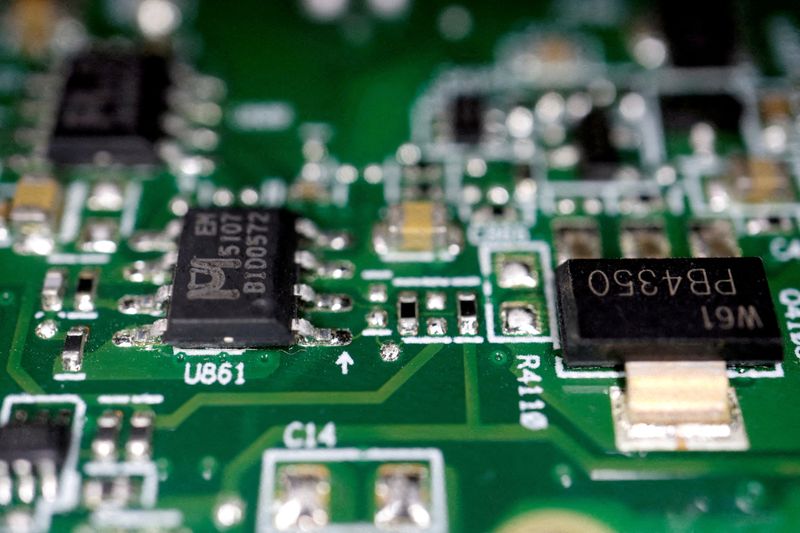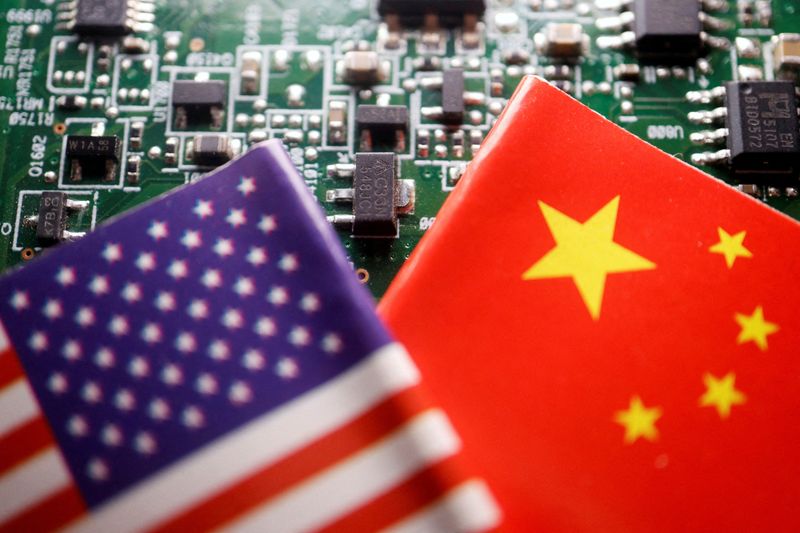By Eduardo Baptista and Brenda Goh
BEIJING (Reuters) -Chinese companies should be wary of buying U.S. chips as they are "no longer safe" and buy locally instead, four of the country's top industry associations said on Tuesday in a rare coordinated response to Washington's curbs on Chinese chipmakers.
The two nations have targeted each other's economies in the last few days, escalating tensions even before U.S. President-elect Donald Trump returns to the White House in January. Trump has promised to impose heavy tariffs on imported Chinese goods, reviving a trade war from his first four-year term as president.
The industry association warnings came after the United States on Monday launched its third crackdown in three years on China's semiconductor industry, curbing exports to 140 companies, including chip equipment maker Naura Technology Group.
Their advice could affect U.S. chipmaking giants such as Nvidia (NASDAQ:NVDA), AMD (NASDAQ:AMD), and Intel (NASDAQ:INTC) which, despite export controls, have managed to keep selling products in the Chinese market. The three companies did not immediately respond to a Reuters request for comment.
The Semiconductor Industry Association, a U.S. trade association representing major chipmakers, said, "Coordinated calls in China to limit procurement of U.S. chips are unhelpful, and any claims that American chips are 'no longer safe or reliable' are simply inaccurate."
The group reiterated its belief that "export controls should be narrow and targeted to meet specific national security objectives ... We encourage both governments to avoid further escalation."
The associations cover some of China's largest industries, including telecommunications, the digital economy, autos, and semiconductors and combined count 6,400 companies as members.
The statements, released shortly after each other, did not detail why U.S. chips were unsafe or unreliable.
Beijing on Tuesday also banned exports of rare minerals used in military applications, solar cells, fibre optic cables and other manufacturing processes. A White House National Security Council spokesperson said the U.S. would take necessary steps to try to deter other "coercive actions" from China and continue efforts to diversify supply chains away from that nation.
Tom Nunlist, associate director at policy research consultancy Trivium China, said the warnings from the associations could be perceived as soft advice. Companies may listen to it, but whether they take action would be dictated by the market.
The export ban on critical minerals was much more crucial, he added.
"China had been moving quite slowly or carefully in terms of retaliating against moves by the United States, but it seems pretty clear that now the gloves are off."
The Internet Society of China urged domestic companies to think carefully before procuring U.S. chips and seek to expand cooperation with chip firms from countries and regions other than the United States, according to its official WeChat account.
It also encouraged domestic firms to "proactively" use chips produced by both domestic and foreign-owned enterprises in China.
U.S. chip export controls have caused "substantial harm" to the health and development of China's internet industry, it added. Companies targeted by the United States said they would be able to continue production due to their efforts to localise output.
The China Association of Communication Enterprises said it no longer saw U.S. chip products as reliable or safe and the Chinese government should investigate how secure the supply chain of the country's critical information infrastructure was.
The warnings echo China's treatment of U.S. memory chipmaker Micron (NASDAQ:MU), which became the subject of a cybersecurity review last year shortly after the U.S. imposed export controls on chipmaking technology to China.

China later barred Micron from selling its chips to key domestic industries, impacting a low-double-digit percentage of its total revenue.
Intel has also faced scrutiny. In October, another influential industry group, the Cybersecurity Association of China, called for a security review of Intel products, saying the U.S. chipmaker had "constantly harmed" the country's national security and interests.
